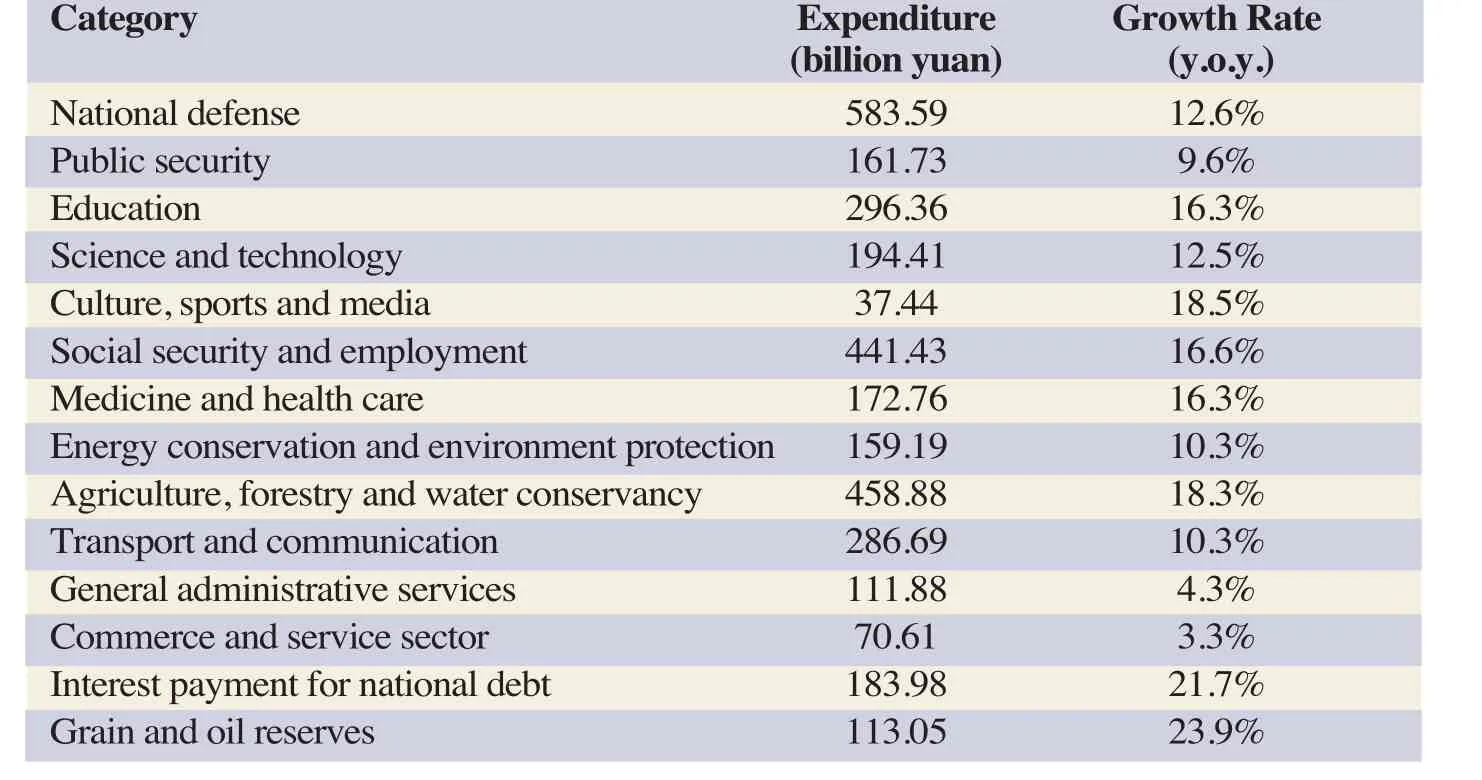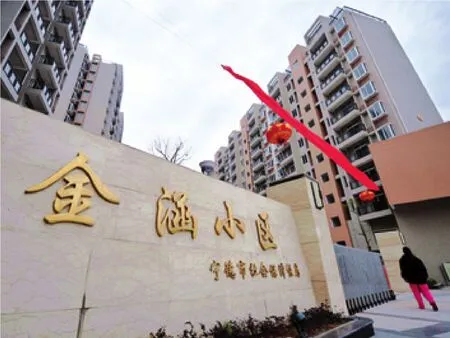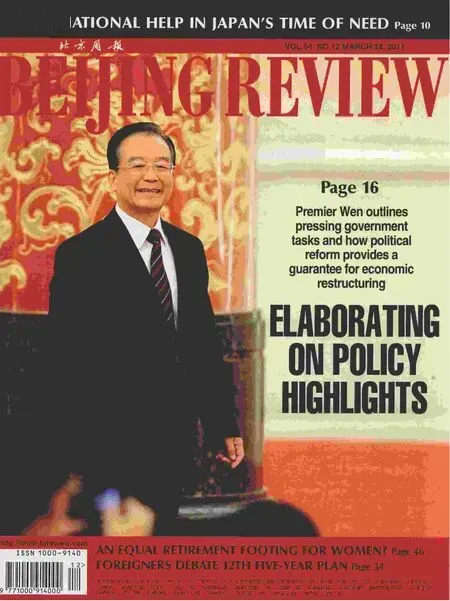A Budget for the People
By LAN XINZHEN
A Budget for the People
By LAN XINZHEN
Redistributing income to improve people’s livelihoods becomes a priority of the central budget
The government’s budget this year will top an unprecedented 10 trillion yuan($1.52 trillion), an increase of 11.9 percent over that of 2010, according to the government’s annual budget report delivered to the Fourth Session of the 11th National People’s Congress on March 5.
The country’s total fiscal revenue will hit 8.972 trillion yuan ($1.363 trillion), up 8 percent year on year. The budget deficit is expected to reach 900 billion yuan ($137 billion), accounting for around 2 percent of GDP, down from last year’s 2.5 percent.
Two thirds of the central budget will be spent on improving the people’s livelihoods this year, said Minister of Finance Xie Xuren at a press conference on March 7.Additionally, 70-75 percent of local budgets will go toward these efforts.
The fi nancial budget on people’s livelihoods, Xie said, will mainly go to two major areas: those directly related to education,medical service, social security, housing,employment and culture; and those involving infrastructure, with a large part appropriated to agriculture being directed to increasing farmers’ incomes.
For an ordinary Beijing resident like Zhang Hongyu, the new central budget might bring new changes to his life. Living in a half century-old apartment without a private toilet or a private kitchen, Zhang looks forward to better living conditions. As a low-income resident, skyrocketing housing prices have put his desire to buy a home out of reach. The recent central budget increase in affordable houses has given him renewed hope.
“I believe I will have a better life,” said Zhang.
For a migrant worker from Shanxi Province in Beijing, the budget expenditure in education may give Wang Weiguo’s nineyear-old son equal access to education in the Chinese capital.
Being a non-registered Beijing resident, Wang used to pay extra fees for his son’s education in Beijing. In addition, his son would face other unfair treatments in taking exams to junior and senior middle schools.
“The new central budget said the government will make efforts to provide compulsory education to migrant workers’kids in cities. I hope my son can enjoy the same treatment as Beijing children,” said Wang.
As the central budget is used to improve people’s living conditions this year, six major tasks need to be accomplished, Xie said.
First, the Central Government will increase investment in education. A guarantee mechanism for compulsory education funding in rural areas will be completed and the benchmark quota per student for public spending in rural middle and primary schools will be increased.The government will continue its efforts in implementing exemptions from tuition and textbook expenses for urban students during their nine-year compulsory education,providing compulsory education for the children of migrant workers in cities, and renovating dilapidated rural schools. The system of aiding poor students in public high schools, universities, and higher and secondary vocational schools will be improved. Boarders from fi nancially strained families that are currently attending middle and primary schools will be given living subsidies.
Second, the government will greatly support reforms to the medicare system, with the aim of increasing the medicare coverage rate to 90 percent of the country’s total population by the end of 2011. It will raise the level of subsidies for urban residents participating in the basic health insurance program and for farmers covered by the rural cooperative medical insurance scheme to 200 yuan($30.36) per person, from 120 yuan ($18.29)per person. The subsidy for basic public health services for urban and rural residents will be raised to 25 yuan ($3.81) per person this year from last year’s 15 yuan ($2.29) per person.
Third, investment in affordable houses for low-income residents will be significantly increased to fulfill the plan of building and renovating 10 million affordable apartments in urban areas and renovating dilapidated houses for 1.5 million rural households.
Fourth, the government will establish a social security system covering both rural and urban residents. The pilot project for the new type of rural pension system will be extended from the current 24 percent to 40 percent of China’s counties, and zeroincome urban residents in these counties will also be covered by the pension system.Retired enterprise employees’ pensions will be increased by 10 percent from the 2010 level this year.

(left) A LARGER SAFETY NET: A sick baby receives an injection in a county clinic in Bengbu City of central China’s Anhui Province. China vows to give 90 percent of its population medical insurance coverage by the end of 2011
Fifth, the government will push forward the development of cultural undertakings.Priorities will be given to cultural projects bene fi ting rural and grass-roots groups, and measures will be taken to ensure free admission to public cultural facilities, including museums, memorial halls and libraries.
Sixth, great efforts will be put into increasing funding for agriculture and agricultural infrastructure, especially water conservancy, river harnessing, reservoir renovation and projects to control such disasters as fl oods and mud-rock fl ow.
“This year the central budget will further increase spending on improving the people’s living conditions,” said Xie. “This means we will focus on some big projects that could ensure and improve people’s well-being.”
In contrast to the expenditure surge for people’s livelihoods, governmental administrative expenses will be cut considerably this year. The central budget set aside 111.88 billion yuan ($18.09 billion) for administrative costs, up 4.3 percent year on year. Given the 4-percent cap of consumer price index growth set by the Central Government this year, the growth of administrative costs will be nearly zero.
The new budget showed the Central Government’s guideline to allocate capital in improving people’s livelihoods, promoting the upgrading of the economic growth mode and optimizing industrial structures, said JiaKang, head of the Institute of Fiscal Science,a think tank affiliated with the Ministry of Finance.

Central Budget Expenditures for 2011 ($1=6.57 yuan)
The signi fi cance of China spending two thirds of its central budget on people’s livelihoods this year is that public fi nance comes from people’s taxes and should therefore be used to pay for upgrades to people’s lives,said He Liping, a professor with the School of Economics and Business Administration at Beijing Normal University.
The spending hikes in public welfare will allow people to use their money instead of hoarding it away in banks for a rainy day,said He.

AFFORDABLE HOUSES: A resident walks into an affordable house community in Ningde City of southeast China’s Fujian Province
For too long, the Chinese economy has relied heavily on investment and exports,said He. Despite the fact that average incomes were low, the dearth of social security made Chinese people likely to save and reluctant to spend, said He.
While increasing spending on people’s livelihoods, the central budget will alleviate low-income residents’ burden on housing,medical and education costs, said He.
To be frank, He said, various efforts and attempts have been made to alleviate the shortage of public services in recent years,but these services still lag far behind people’s demands.
The government should continue to increase the proportion of people’s livelihoods in the central budget in the future to expand domestic demand and ensure people’s wellbeing, said He.

